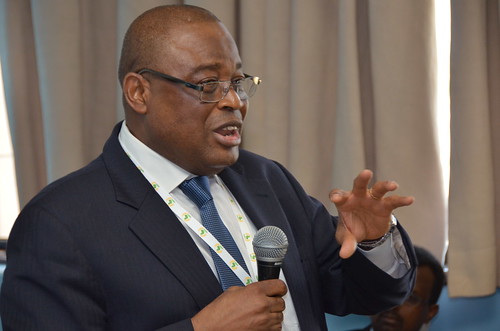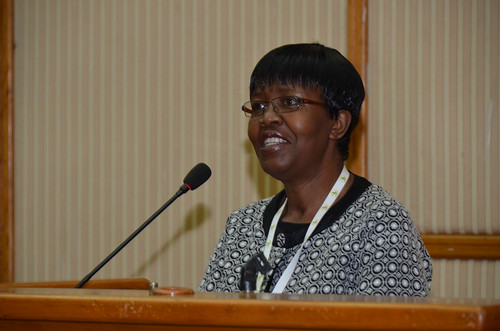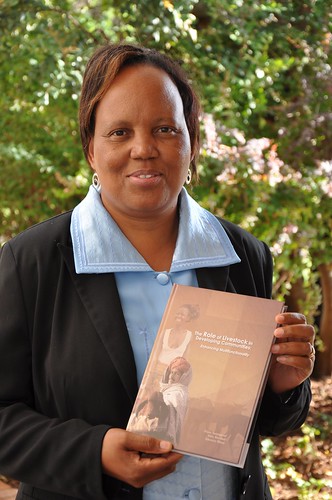Note: This post was developed by ILRI corporate communications writer/editor Paul Karaimu.
The second day of the ongoing (15-20 Jul 2013) sixth Africa Agriculture Science Week of the Forum for Agricultural Research in Africa (FARA), in Accra, Ghana, featured conversations on how to develop climate-smart agriculture, how to improve the resilience as well as productivity of Africa’s smallholder farmers and how to make wider use of demonstrable successes in development of the continent’s capacity for agricultural innovation.
Although small-scale farmers and herders produce most of the continent’s food, many of them remain beyond the reach of agencies providing essential, up-to-date and locally relevant information on optimal crop and animal husbandry practices. Indeed, a significant gap continues to divide researchers of food production from the farmers who produce the food.
Monty Jones, executive director of FARA, speaking at AASW6 (photo credit: ILRI/Paul Karaimu).
And then there are the disabling gaps between research disciplines and fields related to agriculture.
‘Competitiveness is much needed but often neglected in Africa’, says Monty Jones, the executive director of FARA. ‘We need to look at all the elements in our agricultural value chains, including labour productivity, food safety, retail and consumer preferences. These are all needed to enhance our agricultural productivity. Further, we need to integrate research in agriculture with research on climate change and watershed management and other issues that impinge on agricultural productivity.’
Lindiwe Majele Sibanda speaking at Africa Agriculture Science Week (photo credit: ILRI/Paul Karaimu).
Lindiwe Majele Sibanda, a policy expert and beef farmer from Zimbabwe who is chief executive officer and chief of mission of the Food, Agriculture and Natural Resources Policy Analysis Network (FANRPAN), based in Pretoria, agrees.
‘We need to listen to trusted messengers, including non-technocrats and community leaders’, Sibanda says. ‘Only by integrating these local views and knowledge in our policymaking will we have a chance of making our interventions sustainable.’
Sibabda, who also serves as chair of the board of trustees of the International Livestock Research Institute (ILRI), also recommends a review of national support to research institutions.
Our African institutions remain weak. They’re weak because we have not invested in research. We still little appreciate the central role of research in development. A starting point in turning this round would be a call on our governments to use African money to invest in African research institutions. That will help us produce researchers who can help us meet our development goals.—Lindiwe Sibanda
AASW6
FARA’s 6th Africa Agriculture Science Week (AASW6), in Accra, Ghana, included marketplace exhibitions (15–20 Jul 2013), side events on sub-themes (15–16), a ministerial roundtable alongside a Ghana Day (17 Jul), plenary sessions (18–19) and a FARA Business Meeting (20 Jul). The discussions were captured on Twitter (hashtag #AASW6) and blogged about on the FARA AASW6 blog.



